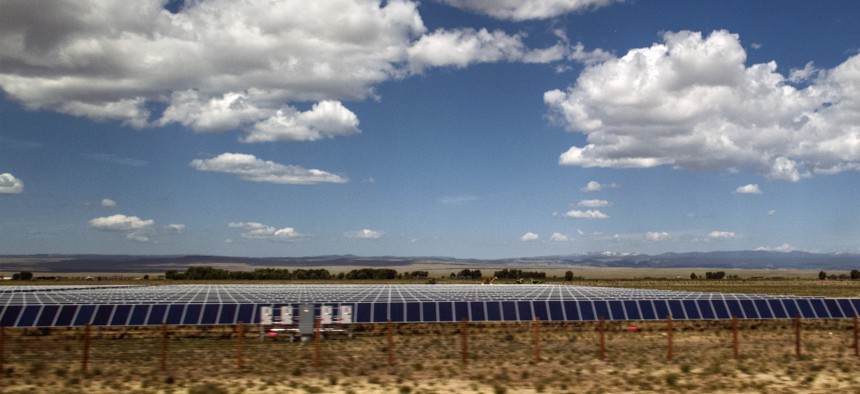'Green Banks,' Poised for Billions in Climate Funds, Draw States' Attention

Newly established green banks are readying for federal support that could supercharge their efforts, while bipartisan leaders in places such as New Mexico are pushing to create their own state green banks. Santi Visalli/Getty Images
These banks provide financing for projects from efficient appliances to solar panels.
This article is republished from Stateline. Read the original article.
In recent years, several states have created or helped to fund specialized banks that lend money to homeowners and businesses for energy-saving and climate projects. Now, states have billions more reasons to establish such institutions, known as green banks.
Congress last year approved a Greenhouse Gas Reduction Fund of $27 billion, largely to pour money into green banks and similar financial institutions. Newly established green banks from Nevada to Illinois are readying for federal support that could supercharge their efforts, while bipartisan leaders in places such as New Mexico and Alaska are pushing to create their own state green banks.
“Everybody is interested in green banks now,” said Reed Hundt, CEO of the Coalition for Green Capital, a climate-focused nonprofit that has spearheaded such efforts across the country. “[The federal funding] is adding a lot of oomph. Nobody should get left out.”
Green banks provide financing to support climate-friendly projects, often focusing on energy savings and solar generation in residential and commercial buildings. Such projects have struggled to obtain capital from traditional financing institutions.
Like conventional banks, green banks provide loans that must be repaid, but they often offer long-term, low-interest loans that aren’t available on the private market. Some use other tools to lower risk for private lenders or to finance projects in partnership with utilities.
Green banks can be public, quasi-public or nonprofit institutions. Several green banks have been established by state lawmakers, governors or agencies, often with some level of state funding. Many state-level green banks have focused much of their work in low- to moderate-income communities, which have the greatest need for energy upgrades and the least access to financing.
Many green banks use public funding to attract much greater amounts of private investment, using tools such as a loan loss reserve to lower risks (and therefore interest rates) for traditional lenders. Such banks use a wide variety of financial mechanisms to back an even wider variety of projects.
“Green banks principally are about taking a limited amount of public money and turning it into multiples of private investment,” said Bryan Garcia, president and CEO of the Connecticut Green Bank, which became the nation’s first state-level green bank in 2011.
The Connecticut Green Bank has used $322 million, primarily from a state ratepayer fund, to attract nearly $2 billion in private investment. Its tools include a loan fund to promote residential solar installations in low-income communities, a bond program to promote solar deployment and a credit enhancement reserve that allows local lenders to provide low-interest loans to homeowners for energy efficiency upgrades.
Energy Efficiency
Even as states work to include more clean energy in their supply, experts say efficiency programs to reduce energy demand are just as essential.
Most green banks have focused their efforts on helping homeowners and businesses reduce energy use by lending money to replace furnaces with heat pumps, install efficient air conditioners and upgrade insulation and windows. Many also support rooftop solar and battery storage projects.
“The majority of our work is basic equipment you need to make your house feel comfortable and save money on your energy bills,” said Mary Templeton, president and CEO of Michigan Saves, a nonprofit green bank that has received some state funding. “We really want to fill gaps in the marketplace and help residents and business owners pay for their loans with their energy savings.”
Green bank officials say many of their projects also help to lower energy costs for residents and businesses, while putting local contractors to work.
“There has long been a disconnect between the capital needs for energy projects in this country and the proper type of capital to match with that,” said John Harris, director of finance with the Missouri Green Bank.
The success of early green bank programs has prompted more states to follow suit in recent years.
“The most crucial thing we can be doing environmentally is figuring out how we can finance this transition,” said Colorado state Rep. Alex Valdez, a Democrat who sponsored legislation in 2021 that established the Colorado Clean Energy Fund.
The fund, created with an initial state investment of $30 million, offers loan programs to help residents and businesses install clean energy and energy efficiency upgrades.
Federal Funds
Other states are considering green bank proposals, with the newfound federal funding adding urgency to the conversation.
“States are looking to hop on the train if they don't have a green bank, because otherwise, that money doesn't have a clear place to go in the state,” said Ava Gallo, climate and energy coordinator with the National Caucus of Environmental Legislators, a collaborative forum for state lawmakers.
Lawmakers in New Mexico are crafting green bank legislation at the urging of the Coalition of Sustainable Communities New Mexico, a group of local governments aligned to support climate policies.
“It's critically important for us to stand up a vehicle now that can receive some of those federal funds,” said Beth Beloff, the group’s executive director. “It would be a huge lost opportunity [if the state failed to establish a green bank].”
Alaska Gov. Mike Dunleavy, a Republican, has pushed lawmakers to establish a green bank, and agency officials in South Carolina have explored the potential for a green bank in recent years.
Nevada lawmakers established a green bank in 2017, but didn’t fund it until 2021, when the prospect of federal money emerged.
“It's pretty critical in Nevada to have this capacity right now with all of the federal funds that are becoming available,” said Kirsten Stasio, CEO of the Nevada Clean Energy Fund. “It’s a huge advantage.”
The federal Greenhouse Gas Reduction Fund, created under the Inflation Reduction Act of 2022, includes $20 billion to support financial and technical assistance for projects that cut emissions, with $8 billion of that designated for low-income and disadvantaged communities.
That fund will serve as a national green bank and is expected to distribute funding to existing green banks throughout the country. Leaders of state green banks say they expect the U.S. Environmental Protection Agency to provide funding details next month.
“This is going to be completely game-changing and help us put our program on steroids,” said Doug Coward, executive director of the Solar and Energy Loan Fund, a Florida-based nonprofit green bank known as SELF that operates in four states.
SELF has financed about $31 million in projects, focusing on helping low-income homeowners replace inefficient air conditioners, water heaters, roofs and insulation. Such upgrades can help residents make their homes better candidates for solar projects.
Hundt, with the Coalition for Green Capital, said several other states have reached out to his group with growing interest.
More than 20 green banks currently operate throughout the country. Some are within state agencies, while others work at the city or county level. Nonprofit green banks sometimes receive state funding and policy backing, while others have no ties to their state government. The Coalition for Green Capital estimates that its members have provided about $2 billion to finance clean energy projects while attracting another $7 billion in private capital.
The initial outlay from the new federal fund, combined with the private capital it’s likely to attract, could trigger as much as $250 billion in climate investments by 2035, Hundt said.
Success Stories
Established green banks say their successes should prompt more states to follow suit.
“The clean energy projects pay for themselves,” said Jeff Diehl, CEO and executive director of the Rhode Island Infrastructure Bank, which was established as a clean water program decades ago but has taken on energy and climate authorities in recent years. “The energy that's being created through renewable assets or money that is saved through energy efficiency upgrades pays for the financing.”
The bank finances projects that include water infrastructure, transportation, clean energy, climate resiliency and brownfield remediation.
In Illinois, lawmakers passed legislation in 2021 to designate the Illinois Finance Authority as the state’s climate bank, while Maryland lawmakers established a Climate Catalytic Capital Fund last year.
The Hawaii Green Infrastructure Authority, established in 2014, has helped residents install rooftop solar panels, which has allowed them to shrink their utility bills even as energy costs have soared. It also has created a program to allow renters to pay for energy upgrades with a charge on their utility accounts.
“We try to leverage financing mechanisms that mitigate risk and invite private capital in,” said Gwen Yamamoto Lau, the bank’s executive director.





